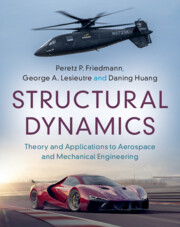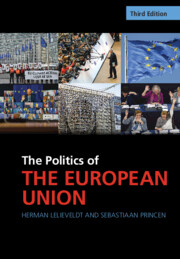Refine search
Actions for selected content:
36807 results in Cambridge Textbooks

Structural Dynamics
- Theory and Applications to Aerospace and Mechanical Engineering
-
- Published online:
- 31 March 2023
- Print publication:
- 23 February 2023
-
- Textbook
- Export citation

A Course in Cosmology
- From Theory to Practice
-
- Published online:
- 31 March 2023
- Print publication:
- 09 March 2023
-
- Textbook
- Export citation

The Politics of the European Union
-
- Published online:
- 30 March 2023
- Print publication:
- 20 April 2023
-
- Textbook
- Export citation
7 - Ecological Approaches to Corporate Sustainability
- from Part I - Corporate Sustainability: Approaches
-
-
- Book:
- Corporate Sustainability
- Published online:
- 09 March 2023
- Print publication:
- 30 March 2023, pp 134-152
-
- Chapter
- Export citation
Subject Index
-
- Book:
- Corporate Sustainability
- Published online:
- 09 March 2023
- Print publication:
- 30 March 2023, pp 625-638
-
- Chapter
- Export citation
25 - International Development and Corporate Sustainability
- from Part IV - Corporate Sustainability: Issues
-
-
- Book:
- Corporate Sustainability
- Published online:
- 09 March 2023
- Print publication:
- 30 March 2023, pp 526-549
-
- Chapter
- Export citation
Part IV - Corporate Sustainability: Issues
-
- Book:
- Corporate Sustainability
- Published online:
- 09 March 2023
- Print publication:
- 30 March 2023, pp 433-557
-
- Chapter
- Export citation
Part I - Corporate Sustainability: Approaches
-
- Book:
- Corporate Sustainability
- Published online:
- 09 March 2023
- Print publication:
- 30 March 2023, pp 27-152
-
- Chapter
- Export citation
14 - Consumers and Corporate Sustainability
- from Part II - Corporate Sustainability: Actors
-
-
- Book:
- Corporate Sustainability
- Published online:
- 09 March 2023
- Print publication:
- 30 March 2023, pp 271-294
-
- Chapter
- Export citation
23 - Business, Climate Change and the Anthropocene
- from Part IV - Corporate Sustainability: Issues
-
-
- Book:
- Corporate Sustainability
- Published online:
- 09 March 2023
- Print publication:
- 30 March 2023, pp 484-505
-
- Chapter
- Export citation
6 - Political Approaches to Corporate Sustainability
- from Part I - Corporate Sustainability: Approaches
-
-
- Book:
- Corporate Sustainability
- Published online:
- 09 March 2023
- Print publication:
- 30 March 2023, pp 117-133
-
- Chapter
- Export citation
24 - Anti-Corruption Governance, Global Business and Corporate Sustainability
- from Part IV - Corporate Sustainability: Issues
-
-
- Book:
- Corporate Sustainability
- Published online:
- 09 March 2023
- Print publication:
- 30 March 2023, pp 506-525
-
- Chapter
- Export citation
Acknowledgements
-
- Book:
- Corporate Sustainability
- Published online:
- 09 March 2023
- Print publication:
- 30 March 2023, pp xxiv-xxiv
-
- Chapter
- Export citation
Boxes
-
- Book:
- Corporate Sustainability
- Published online:
- 09 March 2023
- Print publication:
- 30 March 2023, pp xii-xiii
-
- Chapter
- Export citation
22 - Labour Rights in Global Supply Chains
- from Part IV - Corporate Sustainability: Issues
-
-
- Book:
- Corporate Sustainability
- Published online:
- 09 March 2023
- Print publication:
- 30 March 2023, pp 456-483
-
- Chapter
- Export citation
Contents
-
- Book:
- Corporate Sustainability
- Published online:
- 09 March 2023
- Print publication:
- 30 March 2023, pp v-vii
-
- Chapter
- Export citation
21 - Business and Human Rights
- from Part IV - Corporate Sustainability: Issues
-
-
- Book:
- Corporate Sustainability
- Published online:
- 09 March 2023
- Print publication:
- 30 March 2023, pp 435-455
-
- Chapter
- Export citation
Name Index
-
- Book:
- Corporate Sustainability
- Published online:
- 09 March 2023
- Print publication:
- 30 March 2023, pp 620-624
-
- Chapter
- Export citation
17 - Reporting, Materiality and Corporate Sustainability
- from Part III - Corporate Sustainability: Processes
-
-
- Book:
- Corporate Sustainability
- Published online:
- 09 March 2023
- Print publication:
- 30 March 2023, pp 334-369
-
- Chapter
- Export citation
Figures
-
- Book:
- Corporate Sustainability
- Published online:
- 09 March 2023
- Print publication:
- 30 March 2023, pp viii-ix
-
- Chapter
- Export citation
